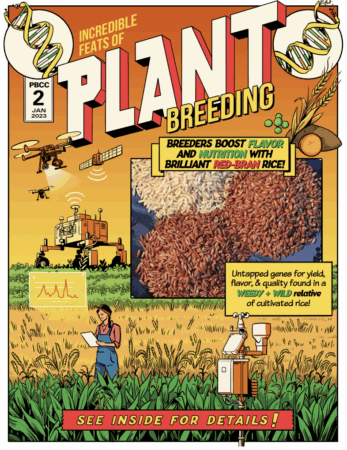Attentive readers will have noticed that the little service we used to have here, whereby you’d get an email whenever there was a new post, is no longer available. Sorry about that. The reason is that it was too expensive. I do share new posts on my social media, but the best way to keep abreast of developments here remains our RSS feed. Nobody talks about RSS any more, but if you hate algorithms, it’s the way for you to follow the sites you want, the way you want. Just choose a feed reader and insert the link. It’s really easy, and liberating in a way. But if you don’t want to mess with a feed reader, and don’t mind an ad or two, you could try Blogtrottr. Just give it the RRS link and your email, choose “daily digest,” and sit back and wait for the email alerts to flood into your inbox. I’ve tried it and it’s ok.
Brainfood: Agroecology, Afghan wheat, CWR microbes, Chocolate microbes, Liberica coffee, Wild apples, USDA cotton collection, Parmesan cattle, Sweetpotato genome, Vertical tomatoes
- Embracing new practices in plant breeding for agroecological transition: A diversity-driven research agenda. Plant breeding for agroecology will need access to locally-adapted plant diversity, sure, but also the involvement of a diversity of stakeholders and the use of a diversity of co-design strategies.
- Conservation and Utilization of Wheat Genetic Resources in Afghanistan Expanded with the Homecoming Wheat Landraces Collected Half a Century Ago. The above could also be said of wheat breeding in Afghanistan. Fingers crossed.
- Blueprints for sustainable plant production through the utilization of crop wild relatives and their microbiomes. Oh, wait, breeders (agroecological and otherwise) will also need the diversity of microbiomes associated with crop wild relatives.
- A defined microbial community reproduces attributes of fine flavour chocolate fermentation. Oh, wait, we will also need the diversity of the microbes involved in fermentation, at some point.
- Genomic data define species delimitation in Liberica coffee with implications for crop development and conservation. It might help if we knew how many species made up a crop in the first place. In the case of Liberica coffee, it turns out to be 3. No word on the microbiomes involved.
- Assessment of genetic diversity and population structure of Malus sieversii and Malus niedzwetzkyana from Kazakhstan using high-throughput genotyping. It would also help to know where interesting diversity was concentrated within crop wild relatives. In apples, it’s not necessarily the ancestor.
- The National Plant Germplasm System cotton collection—a review of germplasm resources, phenotypic characterization, and genomic variation. Lots of morphological characterization and agronomic evaluation, not so much molecular data, but increasing. No word on the microbes.
- Establishing a genomic-driven conservation of a cattle genetic resource: the case of the Parmigiano-Reggiano cheese iconic breed. In contrast, these guys have genotyped practically a whole breed. But yeah, no microbes.
- Phased chromosome-level assembly provides insight into the genome architecture of hexaploid sweetpotato. The contributions of different wild relatives to the sweetpotato genome are to be found intertwined along chromosomes rather than restricted to subgenomes. Unclear what that will mean to agroecologial breeders.
- Harnessing Green Revolution genes to optimize tomato production efficiency for vertical farming. Agroecological breeders unavailable for comment.
Nibbles: USDA Pullman genebank, Another Indonesian genebank, Somali community seedbank, Garlic moves genebanks, Enset conservation, Opportunity crop genebanks
- A primer on the USDA genebank in Pullman.
- Possible genebank in Indonesia. I could have sworn there was one already.
- Community genebank in Somalia. Surely not the only one.
- Garlic moves between genebanks. I’m sure there’s a reason.
- New enset products and processing methods are great, but is there a comprehensive genebank? I wish I could be sure.
- That goes for other “opportunity crops” and “forgotten foods” too.
How to revive your landraces
How can you get humble heirloom varieties of the humble potato back into cultivation? Well, fortunately, Potato News Today 1 has a handy step-by-step guide, which I reproduce verbatim below:
- Start with a story you can legally sell. In Europe/UK, use the conservation-variety route; in North America, lean on certified seed suppliers and Indigenous stewardship agreements.
- Source clean, traceable stock. CIP and the U.S. Potato Genebank maintain indexed, disease-tested material; combine with reputable local seed houses.
- Pilot with chefs and specialty retail. Early-season launches with menu credit and a farm feature move the needle.
- Package the provenance. PDO/PGI examples like Jersey Royal and Papas Antiguas de Canarias show how origin, agronomy, and micro-harvest rituals create value.
- Engineer storage for shape and use. Follow the curing/holding guidance above.
- Ride the calendar. Tie launches and media to the International Day of Potato (30 May) or to local potato festivals.
Sounds pretty sensible, and applicable to other crops as well, I suspect, with a little tweak here and there.
The article also has a list of case studies. This doesn’t include any examples from Italy, but coincidentally a recent paper describes just such a thing. Which maybe points to something that is missing from the Potato News Today playbook, to whit having lots of interesting characterization and other data on your heirloom landraces handy to help get them ready for prime time.
GRIN-U tackles breeding
 The latest GRIN-U newsletter points to a really nice series of infographics from the USDA’s Plant Breeding Coordinating Committee that I didn’t know about. But there’s a whole lot more. Explore away.
The latest GRIN-U newsletter points to a really nice series of infographics from the USDA’s Plant Breeding Coordinating Committee that I didn’t know about. But there’s a whole lot more. Explore away.